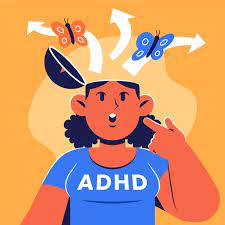Exploring the Connection between ADHD and Anxiety
Introduction
Attention Deficit Hyperactivity Disorder (ADHD) and anxiety are two common mental health challenges that affect children. Understanding the connection between these two conditions is crucial for parents, caregivers, and educators. In this article, we will delve into the world of ADHD and anxiety in children, shedding light on the symptoms, causes, and strategies for support.
Identifying the Symptoms of ADHD
ADHD is a neuro developmental disorder characterized by persistent patterns of inattention, hyperactivity, and impulsivity. Some key symptoms include:
- Inattention: Children with ADHD often struggle to focus on tasks, follow instructions, and complete assignments.
- Hyperactivity: They may exhibit excessive restlessness, fidgeting, and an inability to sit still.
- Impulsivity: Impulsive behavior can lead to hasty decision-making and difficulty in maintaining self-control.
Recognizing Anxiety in Children
Anxiety, on the other hand, is a common emotional response to stress, but when it becomes chronic and over whelming, it can be a cause for concern. Anxiety symptoms in children may include:
- Excessive Worry: Constant worrying about various aspects of life, including school, relationships, and personal safety.
- Physical Symptoms: Children may experience physical manifestations of anxiety, such as stomachaches, headaches, or sleep disturbances.
- Avoidance Behavior: Avoiding situations that trigger anxiety, which can lead to social withdrawal and academic challenges.
The Interplay between ADHD and Anxiety
It's important to note that ADHD and anxiety often coexist. Children with ADHD may be at a higher risk of developing anxiety due to the challenges they face in managing their ADHD symptoms. The constant struggle to concentrate and impulsivity can lead to a sense of frustration and low self-esteem, which, in turn, may contribute to anxiety.
Causes and Triggers
Understanding the underlying causes and triggers of ADHD and anxiety is vital. While the exact origins of these conditions are complex, factors that can contribute include:
- Genetics: Research suggests a genetic component in both ADHD and anxiety disorders. If a family member has either condition, there may be an increased risk.
- Brain Chemistry: Imbalances in neurotransmitters like dopamine and serotonin may play a role in both ADHD and anxiety.
- Environmental Factors: High-stress environments, trauma, or exposure to toxic stressors can increase the likelihood of developing these conditions.
Seeking Professional Help
Recognizing the signs of ADHD and anxiety in children is the first step. If you suspect that your child may be dealing with these challenges, it's crucial to seek professional help. Consulting an ADHD therapist or a mental health expert can provide valuable insights and guidance.
Strategies for Coping and Support
There are several strategies to help children cope with ADHD and anxiety:
- Behavioral Therapy: Behavioral therapy can be effective in managing the symptoms of both ADHD and anxiety. It teaches children coping mechanisms and strategies for self-regulation.
- Medication: In some cases, medication may be prescribed to manage ADHD symptoms, which can, in turn, alleviate anxiety.
- Supportive Environment: Creating a supportive and nurturing environment at home and school is essential. Understanding and patience can go a long way in helping children thrive.
- Healthy Lifestyle: Encouraging a balanced diet, regular exercise, and adequate sleep can contribute to improved overall mental health.
Education and Awareness
Raising awareness about ADHD and anxiety in children is essential. Many misconceptions exist around these conditions, which can lead to stigma and misdiagnosis. By educating parents, teachers, and the community, we can create a more empathetic and understanding environment for children dealing with these challenges.
The Importance of Early Intervention
Early intervention is key when it comes to ADHD and anxiety. The sooner these conditions are identified and addressed, the better the outcomes. Parents and teachers should be vigilant about recognizing the signs and seeking help promptly.
Supportive School Environments
Schools play a pivotal role in supporting children with ADHD and anxiety. Implementing strategies like smaller class sizes, individualized learning plans, and access to counselors can make a significant difference in the academic and emotional well-being of these children.
Coping Strategies for Parents
Parents of children with ADHD and anxiety also need support. Coping with a child's mental health challenges can be overwhelming. Parenting workshops and support groups can provide a space for sharing experiences and learning effective strategies for managing these conditions.
Combating Stigma
Stigma can be a significant barrier to seeking help for ADHD and anxiety. It's essential to combat the stigma associated with these conditions and promote open conversations about mental health.
The Role of Therapy
Therapeutic interventions, such as cognitive-behavioral therapy, can be highly effective in helping children manage their symptoms. These therapies teach children how to recognize and change negative thought patterns and develop coping skills.
The Power of Medication
In some cases, medication may be necessary to manage the symptoms of ADHD and anxiety. It's essential to work closely with healthcare professionals to determine the right treatment plan for your child.
Building Resilience
Teaching children resilience and stress management techniques is crucial. These skills can empower them to navigate the challenges of ADHD and anxiety more effectively.
Conclusion
In conclusion, ADHD and anxiety in children are complex conditions that require attention, understanding, and support. By recognizing the symptoms, causes, and potential interventions, we can provide our children with the tools they need to overcome these challenges and lead fulfilling lives. Remember, seeking professional help from online platforms like TalktoAngel is always a wise step in ensuring the best possible outcomes for your child's mental health. ADHD Therapist from TalktoAngel is highly qualified and experienced. Through their therapies they create a more inclusive and empathetic world for children dealing with ADHD and anxiety.


No comments yet